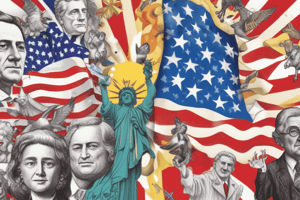Podcast
Questions and Answers
The origins of our two party system can be traced to the...
The origins of our two party system can be traced to the...
- Post-Civil War period
- Struggle for ratification of the Constitution (correct)
- Depression of the 1930s
- Elections of 1800
Membership in either of the two major parties is...
Membership in either of the two major parties is...
- Closely regulated by federal law
- A personal and voluntary matter (correct)
- Closely regulated by State law
- Quite inexpensive, usually costing no more than small monthly dues
In organizational terms, both of our major parties are...
In organizational terms, both of our major parties are...
- Highly decentralized (correct)
- Very disciplined and closely knit
- Virtually leaderless
- Unitary
The two major parties hold their national conventions to select their presidential candidates...
The two major parties hold their national conventions to select their presidential candidates...
Minor parties have...
Minor parties have...
The functions of the major parties in American politics include...
The functions of the major parties in American politics include...
Which of these terms most clearly describes the nature of the two major parties in American politics?
Which of these terms most clearly describes the nature of the two major parties in American politics?
The difficulty in distinguishing the two major parties from one another in terms of their stands on issue questions reflects...
The difficulty in distinguishing the two major parties from one another in terms of their stands on issue questions reflects...
Which of these is NOT an important reason for the existence of a two-party system in this country?
Which of these is NOT an important reason for the existence of a two-party system in this country?
The Republican Party...
The Republican Party...
What political party was in power during WWII?
What political party was in power during WWII?
What political party has been in power the greatest amount of time since 1901?
What political party has been in power the greatest amount of time since 1901?
Which of these Presidents was NOT a Democrat?
Which of these Presidents was NOT a Democrat?
Which of these present-day minor parties is a single-issue party?
Which of these present-day minor parties is a single-issue party?
As a general rule, those people who are ____ are more likely to vote for Republican than for Democratic candidates.
As a general rule, those people who are ____ are more likely to vote for Republican than for Democratic candidates.
Which of these minor parties was a splinter party in American politics?
Which of these minor parties was a splinter party in American politics?
The national committee of each of the major parties...
The national committee of each of the major parties...
When the Constitution was drafted by delegates at the Philadelphia Convention, the Democratic Party...
When the Constitution was drafted by delegates at the Philadelphia Convention, the Democratic Party...
Which of these is NOT a significant factor in the recent decline of the role of parties in American politics?
Which of these is NOT a significant factor in the recent decline of the role of parties in American politics?
Which party was the first to hold a national nominating convention?
Which party was the first to hold a national nominating convention?
Flashcards are hidden until you start studying
Study Notes
Two-Party System Origins
- The U.S. two-party system originated from the struggle for ratification of the Constitution.
- Membership in major parties is personal and voluntary, not heavily regulated by laws.
- Major parties are highly decentralized in organization.
National Conventions and Elections
- National conventions of both parties select presidential candidates every four years, in the year before presidential elections.
- Minor parties have never captured the Presidency but have won various offices at different levels.
Functions of Major Parties
- Major parties nominate candidates, ensure elected officials perform well, and facilitate government processes.
- The nature of the two major parties is characterized by compromise rather than strict discipline.
Political Homogeneity
- Difficulty in distinguishing between major parties' stands indicates an ideologically homogeneous electorate.
- Reasons for the persistence of a two-party system include tradition, single-member district elections, and historical issues, but strong third parties are not a reason.
Historical Party Dynamics
- The Republican Party started as a minority party, with roots linked to Anti-Federalists.
- Democrats held power during World War II and have dominated more of the political landscape since 1901.
Notable Presidents and Parties
- Abraham Lincoln is noted as a President who was not a Democrat; he belonged to the Republican Party.
- Present-day minor parties include single-issue parties; the Right-to-Life Party exemplifies this.
Voter Demographics
- Generally, Protestants are more likely to vote Republican, while other demographics may lean towards Democrats.
- The Bull Moose Party is identified as a significant splinter party in American politics.
National Committees and Party Structure
- National committees comprise members from each state; they play crucial but not overwhelmingly powerful roles in party operations.
Constitutional Context and Political Changes
- When the Constitution was drafted, contemporary political parties such as the Democratic Party did not exist.
- Recent declines in party influence are attributed more to increased independent voting and split-ticket voting rather than solely the impact of television.
Historical Nominating Conventions
- The first national nominating convention was held by the Anti-Masonic Party, indicating historical shifts in political organization.
Studying That Suits You
Use AI to generate personalized quizzes and flashcards to suit your learning preferences.




